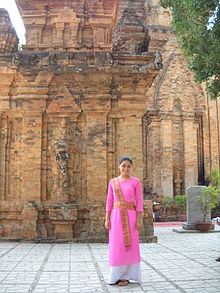
Back Ureueng Campa ACE تشام Arabic تشام ARZ Pueblu cham AST چاملار AZB Чамы Byelorussian চ্যাম জাতি Bengali/Bangla Txams Catalan Cham (Volk) German Τσαμ Greek
ꨂꨣꩃ ꨌꩌꨛꨩ اوراڠ چامفا Urang Campa | |
|---|---|
 Cham women performing a traditional dance in Nha Trang, Vietnam | |
| Total population | |
| c. 822,648 | |
| Regions with significant populations | |
| 600,000[1] | |
| 178,948[2] | |
| 25,000[3] | |
| 10,000[4] | |
| 4,000 | |
| 3,000 | |
| 1,000 | |
| 700[5] | |
| Languages | |
| Cham, Tsat, Haroi, Vietnamese, Khmer | |
| Religion | |
| Predominantly Sunni Islam (Cambodia, Malaysia, Thailand, southern Vietnam, and Hainan, China) Minorities of Kan Imam San, Bani Islam, Hinduism and Theravada Buddhism (central Vietnam)[6] | |
| Related ethnic groups | |
| Utsuls, and other Austronesian peoples (especially Jarai, Rade, Acehnese) | |
The Chams (Cham: ꨌꩌ, چام, cam), or Champa people (Cham: ꨂꨣꩃ ꨌꩌꨛꨩ, اوراڠ چامفا, Urang Campa;[7] Vietnamese: Người Chăm or Người Chàm; Khmer: ជនជាតិចាម, Chônchéatĕ Cham), are an Austronesian ethnic group in Southeast Asia and are the original inhabitants of central Vietnam and coastal Cambodia before the arrival of the Cambodians and Vietnamese, during the expansion of the Khmer Empire (802–1431 CE) and the Vietnamese conquest of Champa (11th–19th century CE).[8][9]
From the 2nd century CE, the Cham founded Champa, a collection of independent Hindu-Buddhist principalities in what is now central and southern Vietnam. By the 17th century CE, Champa became an Islamic sultanate.[10] Today, the Cham people are largely Muslim, with a minority following Hinduism, both formed the indigenous Muslim and Hindu population in both Cambodia and Vietnam.[11] Despite their adherence to Islam, the Cham people still retain their ancestral practice of matriarchy in family and inheritance.[12]
The Cham people speak Cham and Tsat (the latter is spoken by the Utsul, a Cham subgroup on China's Hainan Island), the two Chamic languages from the Malayo-Polynesian branch of the Austronesian family.[13] The Cham people were one among several ethnic groups that were primarily targeted by the Khmer Rouge's ethnic cleansing campaign during the Cambodian Genocide (1975–1979).[14]

- ^ Leonie Kijewski (13 December 2019). "'Beautifying Phnom Penh': Muslim Cham face eviction in Cambodia". Al Jazeera. Archived from the original on 28 May 2023. Retrieved 22 December 2019.
- ^ General Statistics Office of Vietnam (1 April 2019). "2019 Viet Nam Population and Housing Census" (PDF). Archived from the original (PDF) on 26 March 2023.
- ^ Abdul Hamid, Mohamed Effendy Bin (2006). "Understanding the Cham Identity in Mainland Southeast Asia: Contending Views". Sojourn: Journal of Social Issues in Southeast Asia. 21 (2): 230–253. doi:10.1353/soj.2007.0002. ISSN 0217-9520. JSTOR 41308077.
- ^ "Tiny Muslim community becomes latest target for China's religious crackdown". 28 September 2020.
- ^ "Western Cham in Laos". Joshua Project. Retrieved 11 May 2021.
- ^ "Cham". 19 June 2015.
- ^ Cite error: The named reference
leaveswas invoked but never defined (see the help page). - ^ Quang, Tuyen; Noseworthy, William B.; Paulson, Dave (7 September 2022). "Rising tensions: heritage-tourism development and the commodification of "Authentic" culture among the Cham community of Vietnam". Leisure and Tourism. 8. Cogent Social Sciences: 1–23. doi:10.1080/23311886.2022.2116161.
- ^ Wu, Chihkang Kenny; Nguyen, Ngoc Anh; Dang, T. Q. T.; Nguyen, Mai-Uyen (14 December 2022). "The Impact of COVID-19 on Ethnic Business Households Involved in Tourism in Ninh Thuan, Vietnam". Sustainability. 14 (16800). MDPI: 16800. doi:10.3390/su142416800.
- ^ "The Cham: Descendants of Ancient Rulers of South China Sea Watch Maritime Dispute From Sidelines". Science. 18 June 2014. Archived from the original on 25 February 2021. Retrieved 18 January 2023.
- ^ Kijewski, Leonie. "'Beautifying Phnom Penh': Muslim Cham face eviction in Cambodia". www.aljazeera.com. Retrieved 18 January 2023.
- ^ Cite error: The named reference
:6was invoked but never defined (see the help page). - ^ Project, Joshua. "Utsat in China". joshuaproject.net.
- ^ Williams, Francis (18 September 2023). "The eradication of Cham Muslim women's ethnic identity in Cambodia, 1975–79". Journal of Southeast Asian Studies. 54 (3). Cambridge University Press: 502–525. doi:10.1017/S0022463423000498. S2CID 262060374.